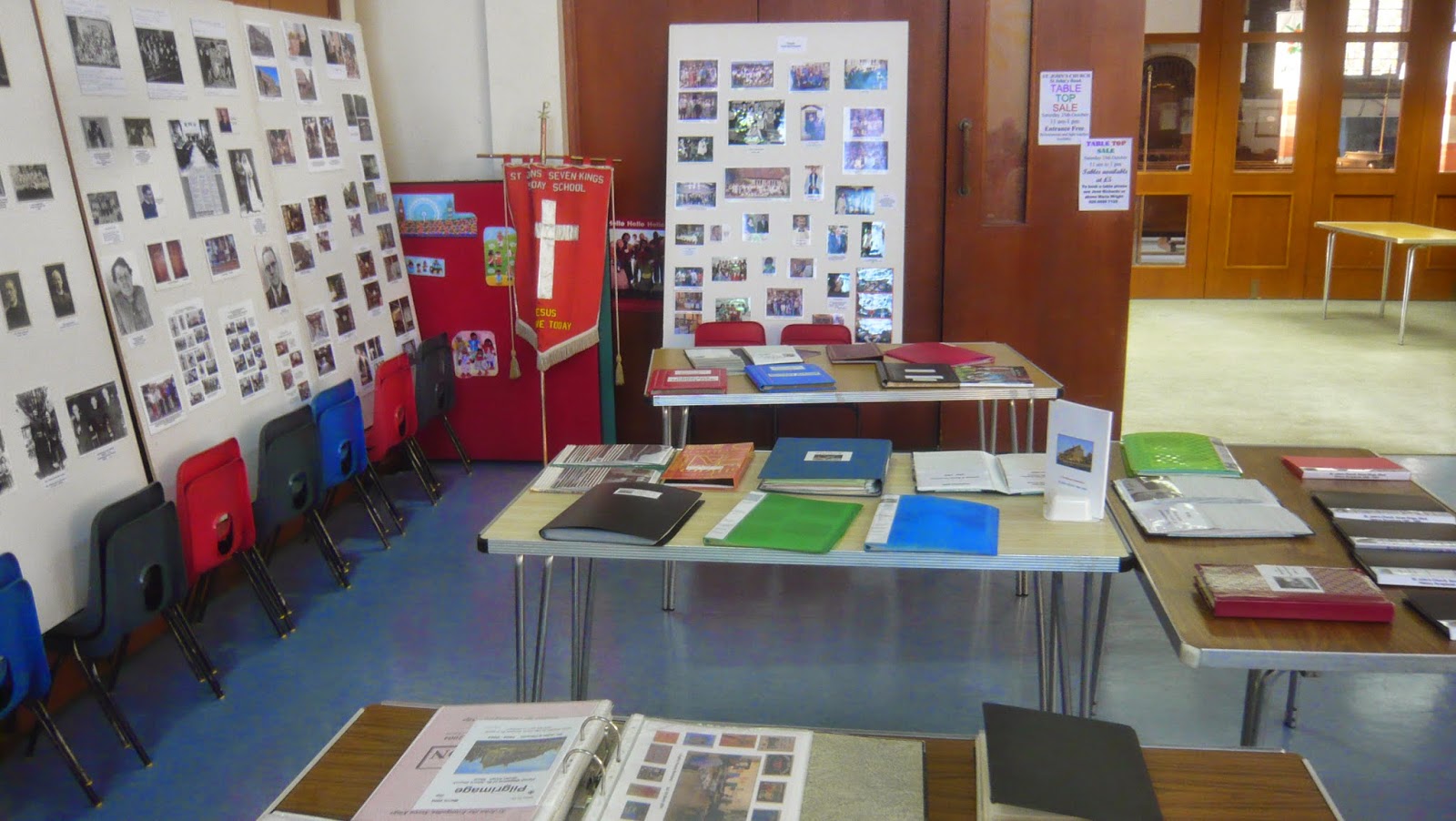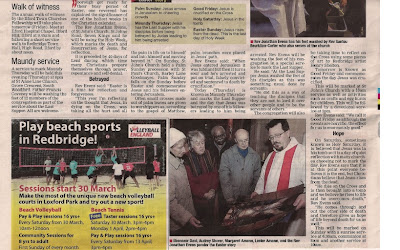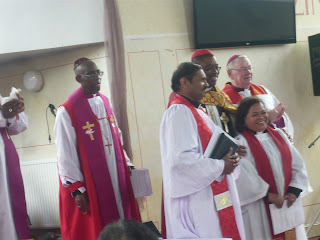St John's Seven Kings celebrated its 110th Anniversary over its Patronal Festival weekend on Saturday 4th and Sunday 5th October. Our celebrations included Choral Evensong (Saturday 4th October, 6.00pm) followed by refreshments, Patronal Festival Service (Sunday 5th October, 10.00am) followed by a Bring & Share Lunch, plus photographic displays and the celebration of special anniversaries/birthdays for congregation members.
Choir members from several local churches supported the St John's Choir in leading worship for our Choral Evensong. The service included the anthem 'A Clare Benediction' by John Rutter.
Many former members of St John's returned for the weekend including:
- Revs. John & Rosemary Enever, who preached at the Patronal Festival Service. Rosemary is a former curate at St John's who became Vicar of St Andrews Great Ilford and Area Dean of Redbridge; and
- Judy Acheson, our former Church Mission Society Link Worker in the Democratic Republic of the Congo . Judy was celebrating 50 years as a Christian. As a result of her ministry in the Congo , St John's continues to support youth work in that country.
Michael Blackstaff, a former server at St John's , had written a reminiscence in which he said, ' St John’s was, and is, a very special place. I was a bit short on blood relations (though very rich in adoptive ones) and came to regard it and its many good people as part of my family. I shall always feel greatly privileged to have been welcomed into its loving embrace.'
There have been more that 15 different significant anniversaries/birthdays which are being celebrated within our congregation this year and all these people were congratulated as part of the Patronal Festival Service. They included two 60th wedding anniversaries, one 50th wedding anniversary, and two 90th birthdays, among others. We prayed for these folk using the following prayer:
There have been more that 15 different significant anniversaries/birthdays which are being celebrated within our congregation this year and all these people were congratulated as part of the Patronal Festival Service. They included two 60th wedding anniversaries, one 50th wedding anniversary, and two 90th birthdays, among others. We prayed for these folk using the following prayer:
Lord Jesus, we thank you for the special milestones which these people have reached in the course of this year. Such moments provide a reason for stopping and remembering all that we have experienced up to that point in our lives; times of great joy and great challenge. In all, as we look back, we see your presence alongside us supporting and equipping us for life. Enabling us to enjoy and share those times of intense joy and pleasure, to bear and share those times of deep anxiety and pain, and to live fully the times in between – those times of ordinary, everyday life in families, church, community, and at work. Thank you for all that you have done and continue to do in the lives of these people and may they know a special joy and blessing from you in the celebration of these particular milestones. Amen.
We also presented a gift to our former curate, Rev. Santou Beurklian-Carter. Following the service, we enjoyed a delicious and varied Bring & Share lunch and viewed photographic displays from the extensive Church archive.
Former Vicar Rev. Gordon Tarry sent a message saying, 'St Johns will always be a very special place and people for Julia and I, and our family. We hope you have a great week-end, with much joy and laughter.'
The weekend was a great encouragement and inspiration through the many testimonies to God's work in many lives through St John's.
We also presented a gift to our former curate, Rev. Santou Beurklian-Carter. Following the service, we enjoyed a delicious and varied Bring & Share lunch and viewed photographic displays from the extensive Church archive.
Former Vicar Rev. Gordon Tarry sent a message saying, 'St Johns will always be a very special place and people for Julia and I, and our family. We hope you have a great week-end, with much joy and laughter.'
The weekend was a great encouragement and inspiration through the many testimonies to God's work in many lives through St John's.
At our 8.00am service I preached the following sermon:
The traditional image for our Patron Saint, St John the Evangelist, is the eagle and that is, of course, why images of eagles can be seen in different parts of our church. This image for John and the writings we traditionally attribute to him wasn’t chosen at random but was selected because it expresses something of what John’s writing do for us.
Richard Burridge, in his important book Four Gospels, One Jesus? tells us that the eagle was used to represent the Evangelist because he gives us the high-flying, far-seeing perspective of the eagle when he writes about Jesus. These writings give us the big picture about Jesus and his significance.
Richard Burridge, in his important book Four Gospels, One Jesus? tells us that the eagle was used to represent the Evangelist because he gives us the high-flying, far-seeing perspective of the eagle when he writes about Jesus. These writings give us the big picture about Jesus and his significance.
We can see this in our Bible readings. In 1 John 1, we read that Jesus, the Word of life, has existed from the very beginning and in John’s Gospel we read of Jesus speaking of his coming again at the end of time. This is the big picture into which John sets the stories and theology that he gives us about Jesus. When John writes about Jesus, he is not simply saying that these are interesting stories about a great human being. Instead he is saying that this is God himself, the alpha and omega, the beginning and the end, walking, talking and acting in the flesh.
In 1 John 1 there are two key features of God that John wants us to grasp in our to understand the significance of the big picture. The first is that God is someone that we can see and the second that God is someone who enables us to see.
John uses the image of the Word made visible to tell us that God is someone that we can see. The heart of the Christian faith, he is saying, is the incarnation; the reality that God, in Jesus, became a human being and lived in a particular culture and time. John was able to say of this Word; “we have heard it, and we have seen it with our eyes; yes, we have seen it and our hands have touched it.” God is no longer detached from us and unknowable to us, instead he has chosen to come close to us, to move into our neighbourhood, to become one of us.
The incarnation is at the heart of Christianity because it is a sign of the love that God has for us. God loves us so much that he is prepared to become one of us, even though this means huge constraints and ultimately leads to his death. As a result, he understands us and understands human life. Now whatever we go through, God has been there before because he has experienced life in all its wonder and heartache.
However, God is not simply someone who can be seen by us. He is also the one by whom we can see. John gives us the image of God as light to help us grasp this facet of God’s being. Light is not something we can see directly but something that enables us to see ourselves and our world. This is what Jesus does for us through the incarnation; he shows what humanity was originally intended to become. For the very first time in the history of the world a human being lives a fully human life.
As a result when we see ourselves and our world in the light of the life of Jesus, what we see is our failure and inability to be the people that we were created to become. In the light of the way that Jesus lived his life, we see our lack of love, joy, peace, patience, kindness, goodness, faithfulness, humility, and self-control. As this letter says, if we say that we have no sin, we deceive ourselves, and there is no truth in us. But when we live in the light, seeing ourselves as we really are, then we become honest with ourselves and with God. By coming into that honesty we confess our sins and are purified of them.
Both these understandings of Jesus are necessary for us to become fully human. If God was just light that exposed our failures then we would be condemned by God. If God was just alongside us as the Word made flesh then there would be no prospect of change for us. But because God, in Jesus, is both the light revealing our failings and the Word made flesh understanding our failings, we can receive forgiveness and change to become more fully human.
John gives us many paradoxes and parallels in his writings. Jesus is both this and that; both Word and flesh; both flesh and light; both message and image; both human and divine. As a result, his writings can seem difficult and dense; yet it is only because Jesus is both/and that we can know what real humanity looks like and have some real prospect of moving towards that reality in our lives. To repeat, it is only because God, in Jesus, is both the light revealing our failings and the Word made flesh understanding our failings that we can receive forgiveness and change to become more fully human. So this Patronal Festival, let us be thankful for the big picture that John paints for us and thank God for the salvation that comes to us because he is Word and flesh; flesh and light; message and image; human and divine.
-----------------------------------------------------------------------------------------
John Rutter - A Clare Benediction.























































